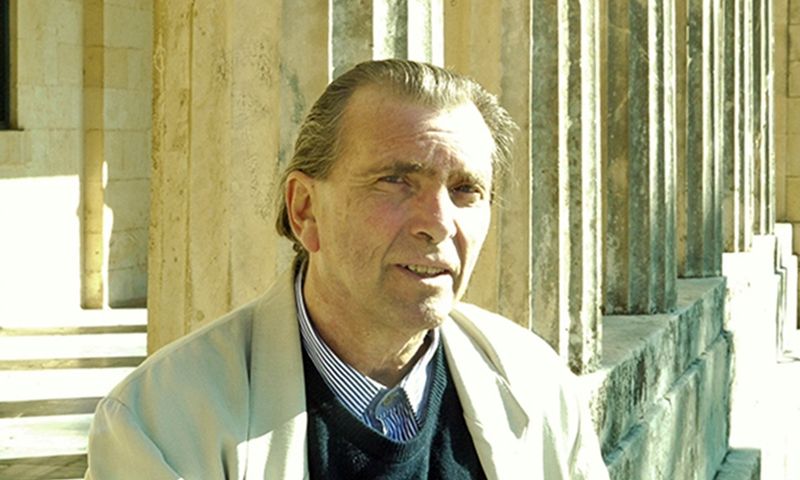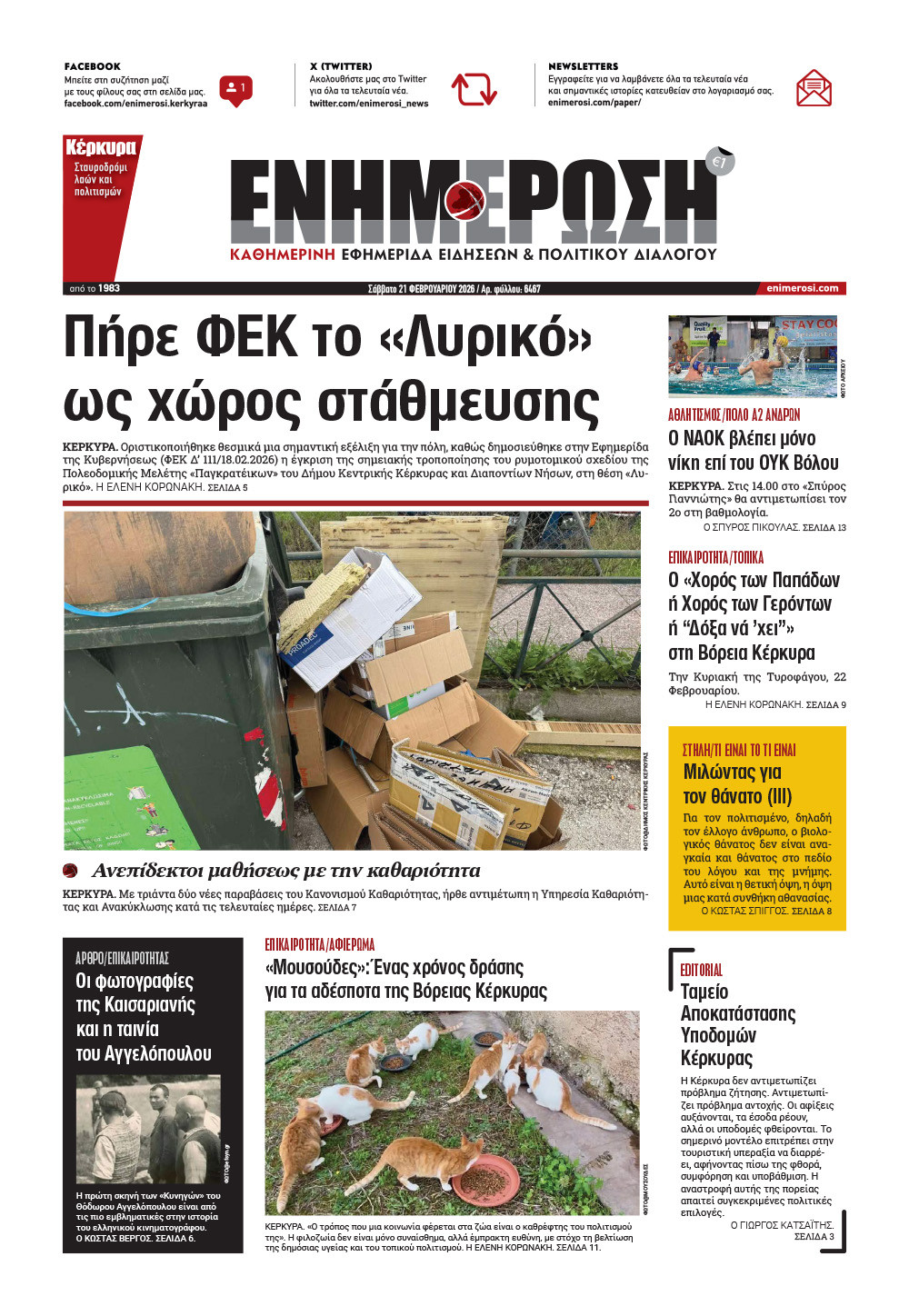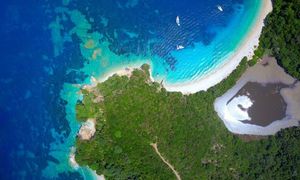Ανοικτή επιστολή του βρετανού συγγραφέα Richard Pine στον Πρωθυπουργό για το θέμα του Ερημίτη

Ερημίτης
27 Ιουλίου 2020
/ 14:42
ΚΕΡΚΥΡΑ. Με ανοιχτή επιστολή στον Πρωθυπουργό Κυριάκο Μητσοτάκη, επανέρχεται στο ζήτημα της επένδυσης του Ερημίτη ο Richard Pine,
διευθυντής της βιβλιοθήκης Durrell στην Κέρκυρα, ο οποίος ζει στο νησί τα τελευταία χρόνια και αρθρογραφεί στους Irish Times της Ιρλανδίας. Μάλιστα, είναι από τους πιο γνωστούς μελετητές του έργου του διάσημου Βρετανού συγγραφέα Λόρενς Ντάρελ που έζησε για κάποια χρόνια στο νησί.
Ο Richard Pine που αρθρογραφούσε τακτικά και στην "Καθημερινή" πρόσφατα δήλωσε ότι διακόπτει τη συνεργασία του με την αγγλόφωνη έκδοση, διότι δεν δημοσιεύθηκε άρθρο του σχετικά με την επένδυση. Το εν λόγω άρθρο, γράφτηκε από τον κ. Πάιν προκαταβολικά και πριν από την επίσκεψη του Πρωθυπουργού και κορυφαίων υπουργών της Κυβέρνησης στην Κέρκυρα, οι οποίοι εγκαινίασαν την έναρξη εργασιών, στέλνοντας ταυτόχρονα το μήνυμα της προσέλκυσης ξένων επενδύσεων στην Ελλάδα.
Αναλυτικά η επιστολή που έγραψε ο κ. Πάιν απευθυνόμενος στον Πρωθυπουργό, μετά την τελετή εγκαινίων στον Ερημίτη (παραθέτουμε το κείμενο στο πρωτότυπο, σεβόμενοι την επιθυμία του να μην μεταφραστεί).
Open letter to PM
by Richard Pine
Dear Prime Minister
On Saturday 11 July you, as head of government, officially inaugurated the "Erimitis" development here in Corfu.
In your speech at Erimitis you made two statements which suggest that you do not fully appreciate the gravity of your decision to support this project. You recognised Erimitis as part of "a very important tourism investment strategy" and you specifically linked it with the development of Elleniko, at the old Athens airport. And you applauded the "intervention" of two government ministers in overcoming what you call "hassles and delays" in the planning process. You even made a joke by saying that the nickname of the land, "Hermit", would be negated by making the site "full of life".
To put in the same frame of reference a disused airport, today almost entirely under cracked concrete, and a pristine area of forest, wetland and posidonia, is to confuse the urban with the rural, the built with the unbuilt, the hard with the soft. The two projects are so dissimilar as to make comparison untenable, except in financial terms.
In your speech you diminished local opposition by suggesting that if the project does not go ahead, "absolutely nothing" would happen, "no new jobs would be created" and that the environment would possibly be endangered.
It seems that you, or your advisers and ministers have reckoned on the basis of a cost-benefit analysis that the cost to Greece, and Corfu in particular, of losing the virginity of Erimitis as an environmental, cultural and social treasure is outweighed by the benefit to the state of the €25m sale price and the commercial consequences.
Yet the developers of Erimitis specifically state that the residents of their hotel and villas will be "affluent visitors with all-inclusive packages” - suggesting that very little income will find its way into Corfu's tourism marketplace.
No-one can disagree with the need to attract foreign investment into Greece. No-one can deny the urgency of creating jobs. You say that the Erimitis project is "good for the place, good for Corfu, good for the country". Noble rhetorical flourishes that ended your speech. But these imperatives must be based on responsible judgement of a politician like yourself to find not what is "good", but the best project for the best place at the best time. You are aware of the very strong local opposition to the project at Erimitis – presented to you by public officials during your visit to Corfu – but you may not have considered that this is not the best project for the place nor the best time to be pursuing it. An alternative – to create a national park, protected generically by the "NATURA 2000" concept of the EU – would surely make an equally strong appeal to your government which is also committed to protecting the environment.
No-one denies that bureaucratic obstacles to projects should be overcome. But there is a major difference between the bureaucratic corridors of the planning system and the courts where those decisions may be challenged and their probity tested. There is a strong possibility that two members of your government exceeded their powers and acted unconstitutionally in over-riding the powers of the local authority – the municipality of North Corfu – in facilitating the planning application for this project.
No-one deplores, more than a xenos like me, the time-wasting journeys from office to office for anything as simple as buying a second-hand car or making a tiny extension to one's house. But for a project of the magnitude of Erimitis – and I refer not only to the amount of concrete involved but the inestimable loss of an ecological treasure – there should be safeguards which respect local circumstances and local opinion.
To suggest that the legitimate legal challenge to the sale of Erimitis by TAIPED to NCH Holdings and the power of the local authority to adjudicate on a planning application are obstructive of progress is to condone the interference in proper procedure by improper executive action.
Selling state assets like the national electricity grid or the state railway company or the telecommunications system does not deprive the citizens of electricity or trains or the internet: in fact, it may raise their quality and increase access to them. Selling Erimitis effectively replaced it with a completely different asset, neither owned nor controlled by the state.
Another cost-benefit analysis comes into play here: where the cost to democracy of denying elected representatives the right to carry out their due functions (which could lead to loss of votes at the next election) is outweighed, it seems, by the benefit of public approval for a decision by a national leader in a matter of expediency.
It can be argued that over-riding the authority and the wishes of the people of Corfu was undemocratic. As the undisputed leader of a democratically elected government, can you not reflect on the dilemma for good governance that you are creating by sanctioning this project which denies and defeats democracy in the name of progress?
How can you answer the Mayor of North Corfu who calls this project "morally unacceptable and socially non-negotiable"? Is there a commercial imperative which supersedes morality and the social good?
Two final points: Firstly, the developers whose plans you support have stated publicly that they will build a hotel of 90 bedrooms, plus a number of individual villas. But your government has granted permission for a hotel of 180 bedrooms. Is there not a discrepancy here? Is the project even more threatening to the environment than we had been led to believe? Secondly, the developers have said that, as a gesture towards the traditional Corfiot way of life, a derelict windmill will be restored. But windmills are not in fact a feature of the traditional Corfiot landscape. Are the developers not grasping at some pointless placebo for Corfu which is entirely misconceived – like the project itself? And are you not, Mr Prime Minister, silently applauding that misconception?
Mr Prime Minister, you have shown yourself to be a resolute leader in the face of the dangers posed by the Covid-19 virus. We all admire you for your leadership in this matter, which has won Greece a place of high esteem in world opinion. I am sure you have the necessary political, cultural and ethical strength to seek the rescinding of this sale, and the preservation of one of Greece's, and the world's, sites of beauty and tranquillity.
Ο Richard Pine που αρθρογραφούσε τακτικά και στην "Καθημερινή" πρόσφατα δήλωσε ότι διακόπτει τη συνεργασία του με την αγγλόφωνη έκδοση, διότι δεν δημοσιεύθηκε άρθρο του σχετικά με την επένδυση. Το εν λόγω άρθρο, γράφτηκε από τον κ. Πάιν προκαταβολικά και πριν από την επίσκεψη του Πρωθυπουργού και κορυφαίων υπουργών της Κυβέρνησης στην Κέρκυρα, οι οποίοι εγκαινίασαν την έναρξη εργασιών, στέλνοντας ταυτόχρονα το μήνυμα της προσέλκυσης ξένων επενδύσεων στην Ελλάδα.
Αναλυτικά η επιστολή που έγραψε ο κ. Πάιν απευθυνόμενος στον Πρωθυπουργό, μετά την τελετή εγκαινίων στον Ερημίτη (παραθέτουμε το κείμενο στο πρωτότυπο, σεβόμενοι την επιθυμία του να μην μεταφραστεί).
Open letter to PM
by Richard Pine
Dear Prime Minister
On Saturday 11 July you, as head of government, officially inaugurated the "Erimitis" development here in Corfu.
In your speech at Erimitis you made two statements which suggest that you do not fully appreciate the gravity of your decision to support this project. You recognised Erimitis as part of "a very important tourism investment strategy" and you specifically linked it with the development of Elleniko, at the old Athens airport. And you applauded the "intervention" of two government ministers in overcoming what you call "hassles and delays" in the planning process. You even made a joke by saying that the nickname of the land, "Hermit", would be negated by making the site "full of life".
To put in the same frame of reference a disused airport, today almost entirely under cracked concrete, and a pristine area of forest, wetland and posidonia, is to confuse the urban with the rural, the built with the unbuilt, the hard with the soft. The two projects are so dissimilar as to make comparison untenable, except in financial terms.
In your speech you diminished local opposition by suggesting that if the project does not go ahead, "absolutely nothing" would happen, "no new jobs would be created" and that the environment would possibly be endangered.
It seems that you, or your advisers and ministers have reckoned on the basis of a cost-benefit analysis that the cost to Greece, and Corfu in particular, of losing the virginity of Erimitis as an environmental, cultural and social treasure is outweighed by the benefit to the state of the €25m sale price and the commercial consequences.
Yet the developers of Erimitis specifically state that the residents of their hotel and villas will be "affluent visitors with all-inclusive packages” - suggesting that very little income will find its way into Corfu's tourism marketplace.
No-one can disagree with the need to attract foreign investment into Greece. No-one can deny the urgency of creating jobs. You say that the Erimitis project is "good for the place, good for Corfu, good for the country". Noble rhetorical flourishes that ended your speech. But these imperatives must be based on responsible judgement of a politician like yourself to find not what is "good", but the best project for the best place at the best time. You are aware of the very strong local opposition to the project at Erimitis – presented to you by public officials during your visit to Corfu – but you may not have considered that this is not the best project for the place nor the best time to be pursuing it. An alternative – to create a national park, protected generically by the "NATURA 2000" concept of the EU – would surely make an equally strong appeal to your government which is also committed to protecting the environment.
No-one denies that bureaucratic obstacles to projects should be overcome. But there is a major difference between the bureaucratic corridors of the planning system and the courts where those decisions may be challenged and their probity tested. There is a strong possibility that two members of your government exceeded their powers and acted unconstitutionally in over-riding the powers of the local authority – the municipality of North Corfu – in facilitating the planning application for this project.
No-one deplores, more than a xenos like me, the time-wasting journeys from office to office for anything as simple as buying a second-hand car or making a tiny extension to one's house. But for a project of the magnitude of Erimitis – and I refer not only to the amount of concrete involved but the inestimable loss of an ecological treasure – there should be safeguards which respect local circumstances and local opinion.
To suggest that the legitimate legal challenge to the sale of Erimitis by TAIPED to NCH Holdings and the power of the local authority to adjudicate on a planning application are obstructive of progress is to condone the interference in proper procedure by improper executive action.
Selling state assets like the national electricity grid or the state railway company or the telecommunications system does not deprive the citizens of electricity or trains or the internet: in fact, it may raise their quality and increase access to them. Selling Erimitis effectively replaced it with a completely different asset, neither owned nor controlled by the state.
Another cost-benefit analysis comes into play here: where the cost to democracy of denying elected representatives the right to carry out their due functions (which could lead to loss of votes at the next election) is outweighed, it seems, by the benefit of public approval for a decision by a national leader in a matter of expediency.
It can be argued that over-riding the authority and the wishes of the people of Corfu was undemocratic. As the undisputed leader of a democratically elected government, can you not reflect on the dilemma for good governance that you are creating by sanctioning this project which denies and defeats democracy in the name of progress?
How can you answer the Mayor of North Corfu who calls this project "morally unacceptable and socially non-negotiable"? Is there a commercial imperative which supersedes morality and the social good?
Two final points: Firstly, the developers whose plans you support have stated publicly that they will build a hotel of 90 bedrooms, plus a number of individual villas. But your government has granted permission for a hotel of 180 bedrooms. Is there not a discrepancy here? Is the project even more threatening to the environment than we had been led to believe? Secondly, the developers have said that, as a gesture towards the traditional Corfiot way of life, a derelict windmill will be restored. But windmills are not in fact a feature of the traditional Corfiot landscape. Are the developers not grasping at some pointless placebo for Corfu which is entirely misconceived – like the project itself? And are you not, Mr Prime Minister, silently applauding that misconception?
Mr Prime Minister, you have shown yourself to be a resolute leader in the face of the dangers posed by the Covid-19 virus. We all admire you for your leadership in this matter, which has won Greece a place of high esteem in world opinion. I am sure you have the necessary political, cultural and ethical strength to seek the rescinding of this sale, and the preservation of one of Greece's, and the world's, sites of beauty and tranquillity.









